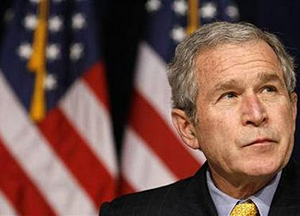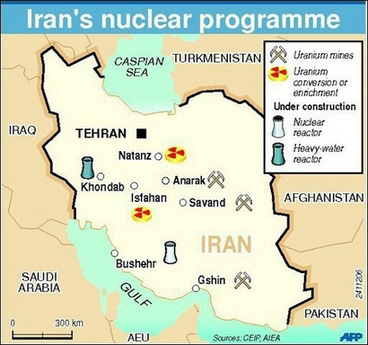 |
 |
 |
 Editorials | Issues | January 2007 Editorials | Issues | January 2007  
America "Poised to Strike at Iran's Nuclear Sites" From Bases in Bulgaria and Romania
 Gabriel Ronay - Sunday Herald UK Gabriel Ronay - Sunday Herald UK


| | U.S. President George W. Bush looks up before speaking at the House Republican Conference in Cambridge, Maryland, January 26, 2007. Bush vowed on Monday to respond firmly if Iran foments violence in Iraq and the White House urged Tehran to play a constructive role in the region. (Reuters/Kevin Lamarque) |
Reports suggest that "US defensive ring" may be new front in war on terror.

President Bush is preparing to attack Iran's nuclear facilities before the end of April and the US Air Force's new bases in Bulgaria and Romania would be used as back-up in the onslaught, according to an official report from Sofia.

"American forces could be using their two USAF bases in Bulgaria and one at Romania's Black Sea coast to launch an attack on Iran in April," the Bulgarian news agency Novinite said.

The American build-up along the Black Sea, coupled with the recent positioning of two US aircraft carrier battle groups off the Straits of Hormuz, appears to indicate president Bush has run out of patience with Tehran's nuclear misrepresentation and non-compliance with the UN Security Council's resolution. President Ahmeninejad of Iran has further ratcheted up tension in the region by putting on show his newly purchased state of the art Russian TOR-Ml anti-missile defence system.

Whether the Bulgarian news report is a tactical feint or a strategic event is hard to gauge at this stage. But, in conjunction with the beefing up of America's Italian bases and the acquisition of anti-missile defence bases in the Czech Republic and Poland, the Balkan developments seem to indicate a new phase in Bush's global war on terror.

Sofia's news of advanced war preparations along the Black Sea is backed up by some chilling details. One is the setting up of new refuelling places for US Stealth bombers, which would spearhead an attack on Iran. "The USAF's positioning of vital refuelling facilities for its B-2 bombers in unusual places, including Bulgaria, falls within the perspective of such an attack." Novinite named colonel Sam Gardiner, "a US secret service officer stationed in Bulgaria", as the source of this revelation.

Curiously, the report noted that although Tony Blair, Bush's main ally in the global war on terror, would be leaving office, the president had opted to press on with his attack on Iran in April.


| | Iran's nuclear programme. Iran has launched a new series of war games and vowed to block UN nuclear inspectors from entering the country in a fresh show of defiance over its controversial nuclear aims. (AFP) |
Before the end of March, 3000 US military personnel are scheduled to arrive "on a rotating basis" at America's Bulgarian bases. Under the US-Bulgarian military co-operation accord, signed in April, 2006, an air base at Bezmer, a second airfield at Graf Ignitievo and a shooting range at Novo Selo were leased to America. Significantly, last year's bases negotiations had at one point run into difficulties due to Sofia's demand "for advance warning if Washington intends to use Bulgarian soil for attacks against other nations, particularly Iran".

Romania, the other Black Sea host to the US military, is enjoying a dollar bonanza as its Mihail Kogalniceanu base at Constanta is being transformed into an American "place d'arme". It is also vital to the Iran scenario.

Last week, the Bucharest daily Evenimentual Zilei revealed the USAF is to site several flights of F-l5, F-l6 and Al0 aircraft at the Kogalniceanu base. Admiral Gheorghe Marin, Romania's chief of staff, confirmed "up to 2000 American military personnel will be temporarily stationed in Romania".

In Central Europe, the Czech Republic and Poland have also found themselves in the Pentagon's strategic focus. Last week, Mirek Topolanek, the Czech prime minister, and the country's national security council agreed to the siting of a US anti-missile radar defence system at Nepolisy. Poland has also agreed to having a US anti-missile missile base and interceptor aircraft stationed in the country.

Russia, however, does not see the chain of new US bases on its doorstep as a "defensive ring". Russia's defence chief has branded the planned US anti-missile missile sites on Czech and Polish soil as "an open threat to Russia".

Sergey Ivanov, Russia's defence minister, spoke more circumspectly while emphasising Moscow's concern. He said: "Russia is not worried. Its strategic nuclear forces can assure in any circumstance its safety. Since neither Tehran, nor Pyongyang possess intercontinental missiles capable of threatening the USA, from whom is this new missile shield supposed to protect the West? All it actually amounts to is that Prague and Warsaw want to demonstrate their loyalty to Washington."

Bush's Iran attack plan has brought into sharp focus the possible costs to Central and Eastern Europe of being "pillars of Pax Americana."
Cheney Says US Is Sending "Strong Signal" to Iran
Michael Abramowitz - Washington Post

Vice President Cheney said the deployment this month of a second aircraft-carrier task force to the Persian Gulf delivered a "strong signal" of the United States' commitment to confront Iran's growing influence in the region.

Countries in the Middle East "want us to have a major presence there," Cheney said in a Newsweek interview published online yesterday. Referring to the deployment of the carrier USS John C. Stennis, Cheney said, "That sends a very strong signal to everybody in the region that the United States is here to stay, that we clearly have significant capabilities, and that we are working with friends and allies as well as the international organizations to deal with the Iranian threat."

When the Stennis arrives in the Persian Gulf next month, the United States will have two carrier groups stationed there for the first time since the 2003 Iraq invasion.

The deployment is one of several recent steps by the United States to oppose Iran, which administration officials say is responsible for growing instability in the region. Other actions included a program to kill or capture Iranian agents operating inside Iraq as well as moves to squeeze the country financially.

In the interview, Cheney declined to speculate about possible military strikes against Iran. "We are doing what we can to try to resolve issues such as the nuclear question diplomatically through the United Nations, but we've also made it clear that we haven't taken any options off the table," he said.

The Newsweek interview was the third granted to the media this month by the vice president, who had been relatively quiet since Republicans lost both houses of Congress in November's midterm elections. Despite increasing GOP criticism of the White House on Iraq, Cheney said he thinks President Bush has shored up his position with his Republican base in the past week and evinced little concern about the prospect of resolutions formally condemning the president's plan to send another 21,500 troops to Iraq.

"Most members on our side of the aisle recognize that what's ultimately going to count here isn't sort of all the hoorah that surrounds these proposals so much as it's what happens on the ground in Iraq. And we're not going to know that for a while yet," said Cheney, who also offered a veiled shot at one of the president's strongest GOP critics, Sen. Chuck Hagel (Neb.). "Let's say I believe firmly in Ronald Reagan's 11th Commandment: Thou shalt not speak ill of a fellow Republican," Cheney said. "But it's very hard sometimes to adhere to that where Chuck Hagel is involved."

In an appearance yesterday on ABC's "This Week," Joseph R. Biden Jr. (D-Del.), chairman of the Senate Foreign Relations Committee, dismissed suggestions from administration officials that his resolution condemning the military buildup would embolden the enemy.

"It's not the American people and the United States Congress who are emboldening the enemy," he said. "It's the failed policy of this president, going to war without a strategy, going to war prematurely, going to war without enough troops, going to war without enough equipment and, lastly, now sending 17,500 people in the middle of a city of 6 1/2 million people with bull's-eyes on their back, with no plan." | 
 | |
 |



